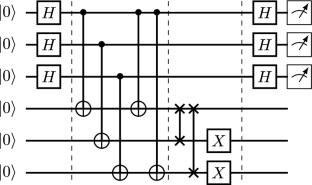关于“Deutsch-Jozsa和Simon算法的高效经典模拟”的评论
IF 2.2
3区 物理与天体物理
Q1 PHYSICS, MATHEMATICAL
引用次数: 0
摘要
最近的一篇论文(Quantum Info.Process 16.92017)提出了一个名为量子模拟逻辑(QSL)的经典框架,该框架能够有效模拟Deutsch–Jozsa和Simon算法。在这篇评论中,我们展示了Deutsch–Jozsa(DJ)和Simon量子算法的实例,它们在QSL版本中产生了不正确的结果,与原始论文的建议和主要结果相矛盾。本文章由计算机程序翻译,如有差异,请以英文原文为准。

Comments on “Efficient classical simulation of the Deutsch–Jozsa and Simon’s algorithms”
A recent paper (Quantum Info. Process 16.9, 2017) proposes a classical framework named Quantum Simulation Logic (QSL) capable of an efficient classical simulation of Deutsch–Jozsa and Simon algorithms. In this comment, we show instances of the Deutsch–Jozsa (DJ) and the Simon quantum algorithms that generate incorrect results with the QSL version, contradicting the proposal and the main results of the original paper.
求助全文
通过发布文献求助,成功后即可免费获取论文全文。
去求助
来源期刊

Quantum Information Processing
物理-物理:数学物理
CiteScore
4.10
自引率
20.00%
发文量
337
审稿时长
4.5 months
期刊介绍:
Quantum Information Processing is a high-impact, international journal publishing cutting-edge experimental and theoretical research in all areas of Quantum Information Science. Topics of interest include quantum cryptography and communications, entanglement and discord, quantum algorithms, quantum error correction and fault tolerance, quantum computer science, quantum imaging and sensing, and experimental platforms for quantum information. Quantum Information Processing supports and inspires research by providing a comprehensive peer review process, and broadcasting high quality results in a range of formats. These include original papers, letters, broadly focused perspectives, comprehensive review articles, book reviews, and special topical issues. The journal is particularly interested in papers detailing and demonstrating quantum information protocols for cryptography, communications, computation, and sensing.
 求助内容:
求助内容: 应助结果提醒方式:
应助结果提醒方式:


